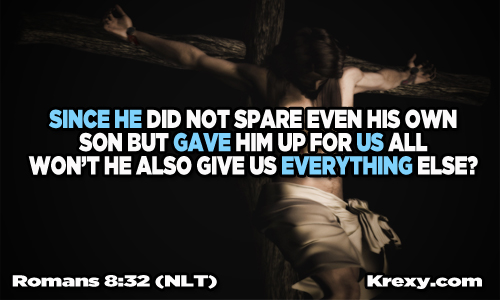Bit of a hiatus here. I finished summer school, spent a week in Maine, and then spent this last week cleaning up the mess in my study resulting from the school year and summer school. In three days I have to get back to teacher meetings, and school starts again the 25th. Short summer. It’s probably a good thing, because I tend to drift and lose focus with a longer break, but now I am just feeling like I can breathe and then I have to go start it all again. Hopefully this year I will be better planned and organized (I started teaching last year two weeks before Christmas, so there was a lot of running in place involved), so my life won’t be so nuts. I do want to get back to posting regularly on here, and not just cookie recipes either! 🙂 Although I know that’s important too. 😉
Last post I talked about the politics of prayer and why, if God knows everything, we need to pray and ask Him for things anyway. I mentioned that there were two reasons we should pray: politics and progress. Today’s post, of course, will be about the progress of prayer.
First off, we’ve probably already realized that we are creatures of necessity. Habit. Mostly selfish, and certainly usually self-serving. At the same time, we look for and desire something better than ourselves, something bigger or more, something that, as popular newsy blogs say, “This Restored My Faith in Humanity”. (Insert other catchy title to draw readers in...) This desire, says C.S. Lewis, shows us that we aren’t made for this world. We wouldn’t want something better if there weren’t something better, and if the knowledge weren’t buried deep at the core of each one of us.

However, although we are drawn to and deeply desire better for ourselves, we tend to simultaneously sabotage our progress towards real, lasting improvement. Whether consciously or subconsciously, we diverge, detour, or completely regress, and then collapse in a metaphysical heap, angry at ourselves and a world that would cause us to lose the progress we’d gained. (Not that I’d know about this…)
Here’s where the progress of prayer comes in. No matter how faltering our baby steps toward personal goals might be, prayer can’t help but shore up our teetering selves and provide an anchor point to draw on. Ellen White says, “Prayer does not bring God down to us, but brings us up to Him” (Steps to Christ, chapter 11). Sounds obvious, but think about it a little more. The reason the Greek and Roman gods seemed so accessible is because they were only larger-than-life copies of humans; superhumans if you will, with all the foibles and issues the real humans had. The Judeo-Christian God, on the other hand, was omniscient and perfect — a daunting Being to believe in when you belong to a race of imperfect self-saboteurs!

If we continue to try to meet God on our level, we will always fail. If we try to clamber up to His on our own, we will also fail. It isn’t till we join our own efforts with prayer — gaining divine assistance — that we will succeed. Again from the chapter The Privilege of Prayer: “Why should the sons and daughters of God be reluctant to pray, when prayer is the key in the hand of faith to unlock heaven’s storehouse, where are treasured the boundless resources of Omnipotence?” (White). Even Jesus (especially Jesus) spent hours and whole nights in prayer, struggling not only against Satan, but against His own inclinations — “Let this cup pass from Me…but not as I will, but as You will” (Matthew 26:39). If He, who was God in human form, felt the need for these long, close communions with God, how much more so should we, who are so very, very human indeed?

Prayer isn’t, then, the means just of talking with God, or asking Him for things. It isn’t a spiritual vending machine or phone conversation. Prayer is meant to be transformative.
We’re familiar with the idea of intercessory prayer, praying for God to intervene in events or in people’s decisions. We pray this type of prayer all the time. “Please heal…” “Help me on this test…” “Bless so-and-so…” Less frequently, we pray in gratitude for something, whether it is blessing a meal, noticing a bird or flower, or in response to having had a previous prayer answered. Another type of prayer is the prayer of worship, where we praise God for who He is, in the world and in our lives. This is less common still. For good examples of this, check the Psalms. There is nothing wrong with these types of prayers.
But the type of prayer that I mean, transformative prayer for our lives, is the scariest type of prayer to pray, and we seldom pray it — and mean it. This type of prayer requires true, deep soul-searching, looking for flawed areas and not only noticing them (as we do tend to pick at ourselves!), but praying that God will change us! Truly, when was the last time you realized something awful about yourself, some major character flaw, and threw yourself at God’s feet to beg Him to change you? And if you did that, did you keep praying, keep trying to change, until you really did?
I can say for myself, it’s easier to notice something wrong with myself than really work and pray to change it. Yeah, I complain about who I am, but it’s comfortable. I’m used to myself. I don’t know who I’d be if I didn’t occasionally lose my temper, for example. “People wouldn’t listen to me”, “I don’t think I can control myself”, “Things just get so…” And that goes for any of a number of issues or flaws I notice about myself. It’s easier to notice flaws, easier to accept flaws (even while bemoaning them), easier to fail, than to change the inner self.
It takes grueling effort, near-constant prayer, and an honest self-evaluation to pinpoint areas to change and change them. It’s not possible without God. Benjamin Franklin famously attempted to change his personality traits, one at a time. He focused on each one for a time until he felt he’d conquered it, then focused on another. But what he found was that as he added new habits or good traits, he started to slip on the ones he thought he’d mastered. He eventually gave it up as a bad job and concluded that people couldn’t really change. But Franklin was a Deist who believed that God created the universe and then just left it to run. He didn’t believe in a personal God or transformative prayer. Think of what he could have accomplished if he had surrendered himself and his faults to God’s power!
Now, obviously if you’re reading closely you’ll realize there’s a bit of “Physician, heal thyself” in this post, because I have many flaws and don’t always take the time, the effort, or the thought to even try to change myself, let alone encompass that full surrender that is necessary.
[And I do think the surrender is necessary. We cannot change if we are not willing to cast anything away that might be potentially hindering. The beginning of the verse above speaks about running a race and putting aside anything that might “easily entangle” us (Hebrews 12:1, 2).]
But, for all of us who profess Christianity, we are not perfect. We are definitely “works in progress”, some more so than others! And there is nothing inherently wrong with that, so long as we remain in progress. Trouble comes when we stagnate or regress, while still claiming to follow Jesus. All the complaints from non-Christians about hypocritical Christians, hateful Christians, etc., come from viewing someone who has stopped following Jesus and is either standing still or (more likely) moving away from Him.
So that progress in prayer? Vital. It should be our most-prayed prayer, rather than our half-hearted, hope-He-doesn’t-really-hear-me mumble buried in the litany of “please”, “praise”, or “thanks”. The transformative prayer is what is going to cause us to grow up to the “measure of the stature of the perfect man” (Eph. 4:13). It is the only thing that will erase our sinful selves and recreate a character worthy of heaven. It is the way to the “mind of Christ” (Phil. 2:5).
Take a challenge with me? Pick a character trait you don’t like about yourself, just as Franklin did. But instead of relying on a little notebook, fix your eyes on Jesus. Pray. Surrender. Immerse yourself in transformative prayer. Let’s see what happens. I can promise you it’ll be scary, but you can’t imagine where He will take you if you do!











